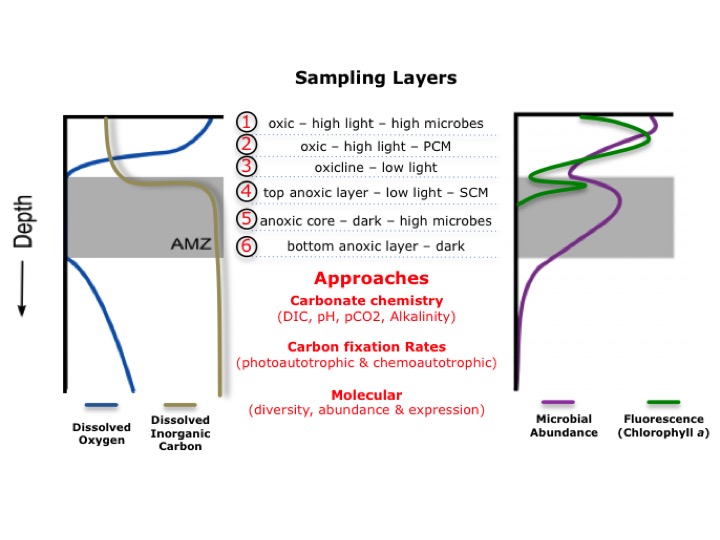Coastal upwelling systems are very productive ecosystems and play a key role in the ocean carbon cycle. In northern Chile upwelliing process are stronger in summer and weaker in winter, presenting a surface fertilized layer, with high levels of photosynthetic primary production, and below of a sharp oxycline, an oxygen-depleted layer from the Anoxic Marine Zones (AMZ).
Geochemical and stable isotope data suggest that part of the spatial and temporal variability in the carbonate chemistry of the AMZ off northern Chile could be associated to surface productivity, suggesting a dynamic shift from a chemoautotrophic-dominated AMZ to a largely heterotrophic system fuelled by surface derived organic detritus when phytoplankton biomass is higher in surface waters.
Global warming is contributing to the expansion and shoaling of the AMZs. Because microorganisms dominate oxygen-deficient environments, their processes and metabolisms are expected to become more relevant, playing key roles in the microbially driven cycling of nutrients and carbon at a global scale. However, there is a lack of knowledge of how the microbial community inhabiting these waters can be changing the carbon chemistry through heterotrophic and chemoautotrophic processes that release and fix carbon respectively.
Thus, this project aims to address questions such as:
- Is the surface primary productivity related to the carbon fixation within the subsurface oxygen-deficient layer?
- How chemoautotrophic processes influence carbonate geochemistry (e.g. DIC, alkalinity) and carbon fixation in the oxygen-deficient layer?
- What are the predominant carbon-fixing metabolic pathways? Which microorganisms are responsible for these pathways?
The general objective of this project is to achieve a comprehensive understanding of the influence of the surface primary productivity over the carbonate chemistry, carbon fixation and the different autotrophic metabolic pathways of chemoautotrophic community in subsurface oxygen-depleted waters. The planned field sampling consider the water-column carbonate chemistry characterization, incubations for metabolic rates and molecular analyses will allow to evaluate the contribution of chemoautotrophic processes within the oxygen-deficient layer. The results will generate valuable information for future better ecosystem modeling and predictions of the biological and biogeochemical consequences of future changes in both productivity and oxygen content of the ocean.

